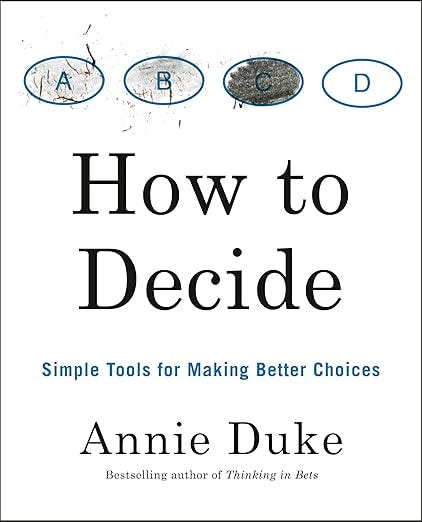“The best decisions often involve turning the unknown into the known.”
There are only two things that determine your life: luck and the quality of your decisions. And you only have control over your decisions.
How to Decide by Annie Duke provides a practical guide to mastering the art of decision-making. Combining her expertise as a former professional poker player with insights into cognitive psychology, Duke introduces a structured, teachable approach to making smarter, more confident decisions.
The first and most important distinction she makes is that decisions are just bets (well, she is a former professional poker player ♣️) - and that means, decisions have probabilities.
“The quality of your decisions will determine the quality of your life." - Annie Duke
📣📣
BigIdeas.FM subscription now integrates with Spotify and Apple Podcasts. Subscribe on the webapp and listen anywhere!
Plus: The lifetime subscription is now available at 70% discount - only to the first 100 customers.8 big ideas from the book
Decisions Are Bets
Every decision we make is essentially a bet on the future. Unlike simple choices, decisions involve predicting outcomes that are uncertain and influenced by factors beyond our control.
Decisions are bets on the future, not a guarantee of an outcome
Viewing decisions as bets forces us to assess probabilities and weigh the potential risks and rewards of each option. This approach helps us recognize that no decision guarantees success but can increase the likelihood of achieving favorable results. Duke argues that embracing this mindset allows us to move away from binary thinking and adopt a more nuanced approach, making us better equipped to handle uncertainty in life.
Resulting: Don’t Judge Decisions by Outcomes
One of the most important lessons is to separate the decision-making process from the result. This concept, called "resulting," refers to judging the quality of a decision based on its outcome.
Duke argues that luck and randomness significantly influence outcomes, so a good decision can lead to a bad result and vice versa. Instead of looking at results, evaluate decisions by the logic, information, and probabilities considered at the time.
By focusing on the process, you can improve future decisions without falling prey to the hindsight bias that often distorts lessons from past experiences.
Resulting is the enemy of learning. Focus on process, not outcomes
Think in Probabilities, Not Certainties
Duke stresses the importance of replacing black-and-white thinking with probabilistic thinking. Decisions aren’t about certainty but about the likelihood of various outcomes. By quantifying uncertainty and assigning probabilities, you can make informed choices.
"Every decision is a choice between different futures, not different outcomes."
This approach requires gathering data, analyzing past experiences, and considering multiple scenarios. It helps avoid overconfidence or underestimation of risks. Thinking probabilistically also encourages humility—acknowledging that even with the best information, we cannot predict the future with absolute certainty, which keeps us flexible and ready to adapt to unexpected developments.
Use Decision Trees for Complex Choices
Duke introduces decision trees as a tool to break down complex choices into smaller components. A decision tree maps out options, possible outcomes, probabilities, and potential rewards.
This structured approach helps clarify the implications of each path and allows you to weigh costs and benefits systematically.
Good decisions don’t always lead to good outcomes, and bad decisions don’t always lead to bad outcomes.
By visualizing decisions this way, you reduce overwhelm, identify key trade-offs, and ensure all aspects of a choice are considered. This method also helps communicate your reasoning to others, fostering collaboration and reducing ambiguity in team-based decision-making.
Define Success Through Objectives, Not Outcomes
Success is often tied to outcomes, but Duke argues that a better measure of success lies in meeting your objectives. Objectives are the guiding principles that shape your choices.
By clearly defining what you aim to achieve, you can evaluate decisions based on alignment with your goals, regardless of external results. This focus on process-driven success helps reduce the emotional impact of unfavorable outcomes, ensuring you stay committed to long-term priorities.
Duke stresses that clarity in objectives allows for better prioritization, more consistent decision-making, and less reliance on luck or external validation.
The Importance of Feedback Loops
Duke highlights the critical role of feedback in improving decision-making. Feedback allows us to refine our processes, but it must be approached correctly. Not all feedback is valid—some may be noise or influenced by external factors.
She suggests focusing on process-based feedback rather than outcome-based feedback. Ask, "Did I make this decision rationally, given the information I had?" rather than "Did this decision turn out well?"
Over time, analyzing patterns and trends in feedback helps identify strengths and areas for improvement, making decision-making more robust.
Use a Decision Journal
A decision journal is a powerful tool for tracking choices and evaluating them later. Duke recommends recording key decisions, including the context, reasoning, expectations, and potential outcomes.
This practice creates a record that can be revisited to assess whether the decision-making process was sound. It also reduces hindsight bias by capturing thoughts in the moment, helping us learn from past experiences objectively.
Over time, journaling uncovers patterns, highlights areas for growth, and helps refine strategies. It turns decision-making into a continuous learning process, grounded in evidence and reflection.
This book offers a clear framework to dismantle hidden biases, understand the role of luck in outcomes, and seek high-quality feedback. Through interactive exercises, readers can troubleshoot past choices, learn when to act quickly or take time, and align decisions with their values and goals. Whether navigating career paths, financial investments, or personal relationships, How to Decide equips you with tools to enhance clarity, productivity, and confidence, ultimately leading to more satisfying and regret-free choices.
By integrating Duke’s actionable techniques, this book empowers readers to embrace decision-making as a skill, making it a must-read for anyone looking to optimize their thinking process in all areas of life.
Here are five key lessons from How to Decide by Annie Duke:
Focus on Decision Quality, Not Just Outcomes: Good decisions can sometimes lead to bad outcomes due to factors like luck or unforeseen circumstances. Duke stresses evaluating the decision-making process itself rather than solely judging by the results, which helps avoid outcome bias and improves future decisions .
Embrace Uncertainty: Uncertainty is a natural part of decision-making. Instead of avoiding it, embrace it by gathering diverse data, considering multiple perspectives, and remaining open to revising decisions based on new information. This approach leads to more informed and adaptable choices .
Think in Probabilities: Decisions should be based on the likelihood of various outcomes rather than binary “yes” or “no” conclusions. Assigning numerical probabilities allows for clearer communication and a better assessment of risks and rewards .
Use Mental Models to Simplify Complex Decisions: Tools like inversion (thinking backward from the desired outcome), probabilistic thinking, and second-order thinking can help in breaking down complicated scenarios and identifying the best course of action .
Learn from Feedback and Mistakes: Actively seeking feedback and analyzing past decisions, regardless of their outcomes, helps improve future decision-making. Mistakes are opportunities to refine skills and processes rather than failures .











